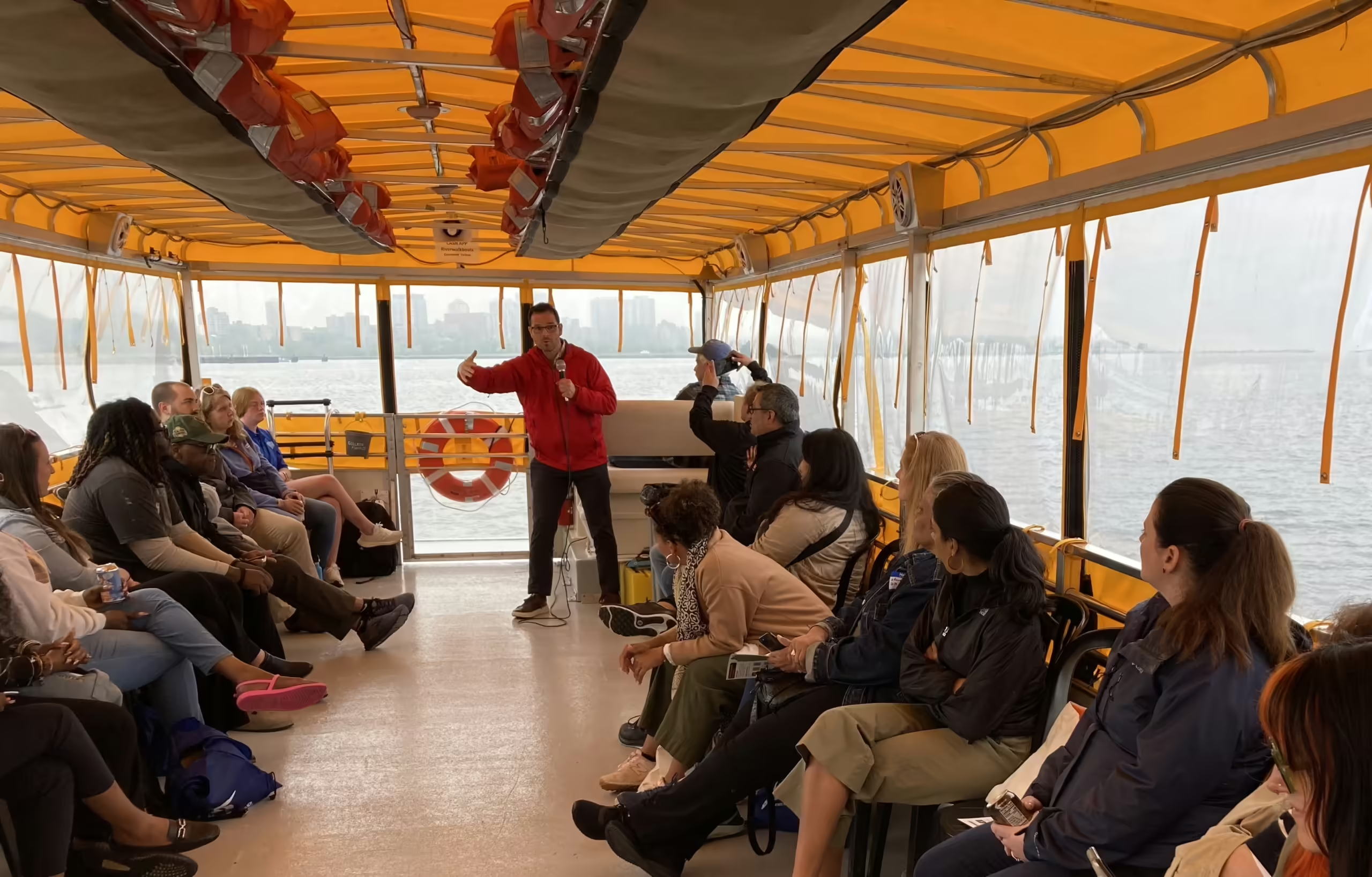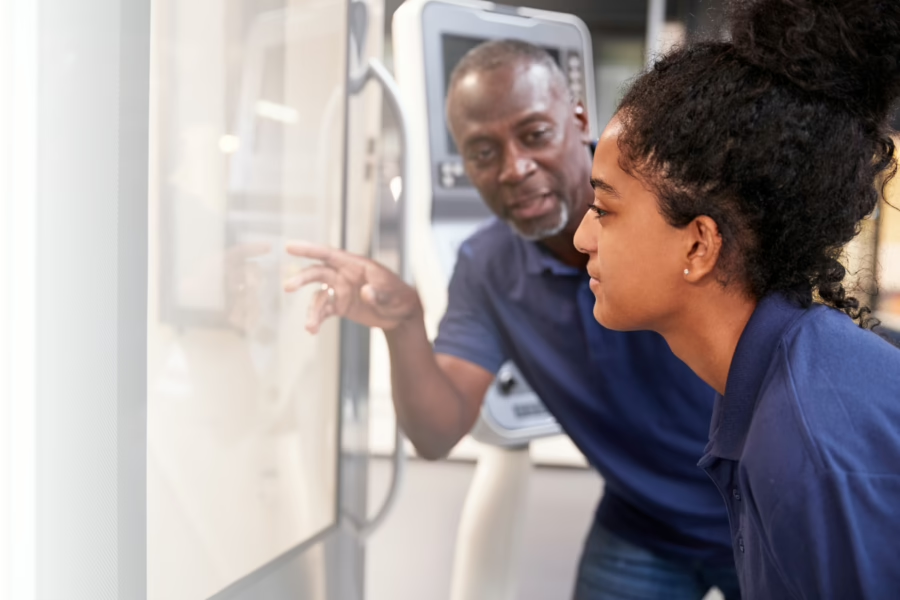This spring, the Milwaukee and Pittsburgh Water Equity Taskforces engaged in the first independently organized in-person learning exchange in the history of our Water Equity Network. This exchange was initiated, facilitated, and organized by both cities out of a shared desire to learn from each other’s efforts to enhance authentic partnerships for water equity amongst regional stakeholders and think creatively and boldly about equitable workforce development in the water sector. Joe Fitzgerald of Milwaukee Water Commons worked with the support of Jamil Bey, CEO of Urbankind Institute and Director of City Planning in Pittsburgh and Mora McLaughlin, Public Affairs team member at Pittsburgh Water and Sewer Authority, to coordinate logistics and develop an engaging agenda.
 The exchange centered around each city’s Water Equity Roadmaps, which outlined both Pittsburgh’s and Milwaukee’s water equity recommendations and calls to action. Since these roadmaps were developed years ago, the learning exchange served as a way for each city to reflect on the progress they’ve made towards achieving their goals—noting accomplishments and challenges along the way as well as next steps.
The exchange centered around each city’s Water Equity Roadmaps, which outlined both Pittsburgh’s and Milwaukee’s water equity recommendations and calls to action. Since these roadmaps were developed years ago, the learning exchange served as a way for each city to reflect on the progress they’ve made towards achieving their goals—noting accomplishments and challenges along the way as well as next steps.
The learning exchange offered a rich blend of on-site experiences and intimate, guided conversations. On Tuesday, the group embarked on a tour of Century City Triangle Neighborhood and the 30th Street Corridor. This project showcased how community advocates collaborated with various public institutions, nonprofits, contractors, and design firms with a common goal of maximizing stormwater management and addressing longstanding neighborhood flooding issues.
Clean Wisconsin, a local nonprofit, partnered with residents and property owners to implement stormwater management solutions on their properties. Milwaukee Metropolitan Sewerage District (MMSD) then worked with the nonprofit, residents, and contracted design firms to shape a larger stormwater system within the park. This tour highlighted the effectiveness of community-driven initiatives in tackling stormwater challenges and underscored the importance of community leadership and partnerships in achieving sustainable solutions.
In the afternoon, participants enjoyed a guided boat tour of Milwaukee’s rivers and Lake Michigan. This immersive experience provided insights into the Great Lakes Area of Concern program and how federal, state, and local partners are working together to implement over $450 million in waterway restoration in the Milwaukee River Estuary. The tour included talks from members of Milwaukee’s Waterway Restoration Partnership, Shalina Ali of TRUE Skool, Pete Coffaro and Christina Taddy from MMSD, Cheryl Nenn of Milwaukee Riverkeeper, and Brennan Dow of the Wisconsin Department of Natural Resources. Each speaker unpacked the experiences of working together to ensure Milwaukee’s restoration efforts integrate environmental justice, water equity, and workforce development while meeting state and federal regulatory requirements. They also highlighted the importance of working intentionally to foster strong and healthy relationships with the waters that run through a community—something both cities know well.
 The following day, the group shared insights from each city’s lead service line replacement program—unpacking what it means to work authentically in partnership toward water equity. The group outlined that partnerships should include solidarity, respect, and trust as well as shared planning and decision-making, peer-to-peer relationships, and management of power dynamics. Participants brought those insights and conversations to the Wisconsin Regional Training Partnership to learn about workforce development strategies operating in Milwaukee. Attendees discussed opportunities for these general workforce programs to address water infrastructure challenges and overcome disparities in the diversity of the water workforce. These discussions highlighted the synergy between equitable workforce development and the water industry.
The following day, the group shared insights from each city’s lead service line replacement program—unpacking what it means to work authentically in partnership toward water equity. The group outlined that partnerships should include solidarity, respect, and trust as well as shared planning and decision-making, peer-to-peer relationships, and management of power dynamics. Participants brought those insights and conversations to the Wisconsin Regional Training Partnership to learn about workforce development strategies operating in Milwaukee. Attendees discussed opportunities for these general workforce programs to address water infrastructure challenges and overcome disparities in the diversity of the water workforce. These discussions highlighted the synergy between equitable workforce development and the water industry.
The closing session focused on reflections and actionable steps. Participants deliberated on the week’s discussions and emphasized team structures, accountability, and the future implementation of each city’s water equity roadmap. This learning exchange represented a unique opportunity for Milwaukee and Pittsburgh to collaborate and learn while serving as a chance for several new members of each Taskforce to become acquainted with the work and our shared One Water mission.
The Pittsburgh contingency left feeling excited about the strong community partnerships around apprenticeship programs and the group-oriented approach to workforce development in the Milwaukee region. They were particularly inspired by the Northwest Side CDC’s Green Tech Station—a “green infrastructure destination”—managed in part by local partners like ReFlo, a nonprofit based in Milwaukee with a mission of catalyzing sustainable water use, green infrastructure, and equitable water resource management.
The Milwaukee Taskforce shared how critical it is to make space for partners to come together to learn about and celebrate the work happening in their own cities and amongst their peers nationwide. The team especially appreciated the opportunity to reflect on what it means to work authentically as a partner in the movement for water equity and how accountability and solidarity inform the work of Taskforce members. Following the learning exchange, the Milwaukee Taskforce will build on insights from the Pittsburgh team to develop systems for tracking and reporting on the equity work they accomplish.



